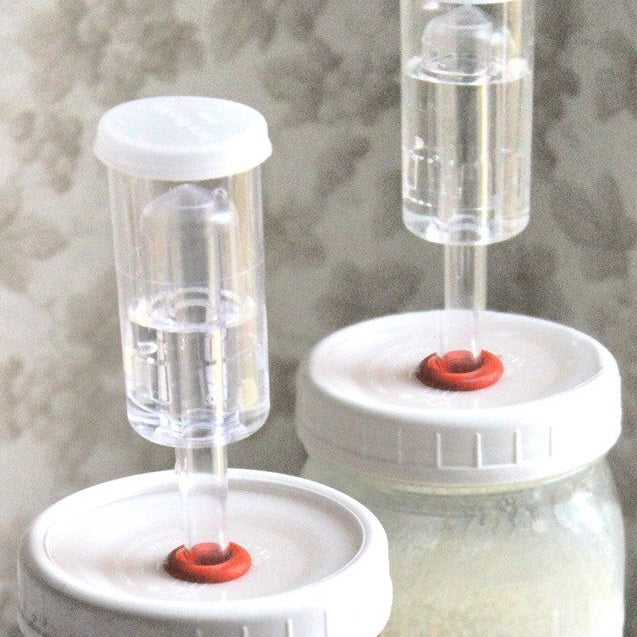
What is milk kefir ripening?
Milk kefir ripening is simply letting your strained finished kefir (without the grains) sit out at room temperature for several hours or days before consuming. Since refrigeration is relatively new, kefir was traditionally ripened to some degree before consumed.
Difference between ripening and a 2nd ferment
Technically they are the same thing and can be interchangeable. Both refer to the fermentation period after the kefir is strained and the grains are out.
However, generally people like to use the term 2nd ferment when they add things like fruits, juices, sugars, peels, extracts or flavorings and then let it sit out at room temperature to continue. And generally, when people say they want to ripen the kefir, its usually without adding anything. It can be confusing because you can do a “2nd ferment” without anything added or “ripen” your kefir with flavorings.
Nutritional benefits
Milk kefir ripening has numerous health benefits. The first one is that there is less lactose. The active microbes in the finished kefir will continue to consume the lactose that remains which in turn means a more digestible drink. It’s especially important for people who are lactose intolerant or even sensitive to lactose (which is likely most people).
The vitamin content will increase. Vitamins and nutrients increase and also become more bio-available as it ripens. This is especially true for the B vitamins (particularly B1, B6 and B9). Another name for B9 is folic acid. In one study, B9 or folic acid increased by 116% compared to fresh kefir and fresh milk (check).
Flavor
Ripening kefir will allow the flavors to increase and meld together. It’s probably best described as a multi-dimensional flavor where you can detect different layers of flavor. When you drink kefir fresh, it has more of a dry, sour flavor. Even though ripening will make the drink stronger, it takes away some of the sharpness. There’s also more fizz (C02) and alcohol when adds to that feel of that multi-dimension.
Pathogen protection
Ripening your kefir will add some extra protection to the ferment. One interesting study showed that Listeria significantly decreased with kefir stored at room temperature (ripened) compared to kefir stored in the fridge. The study also compared industrial kefir against unpasteurized kefir and pasteurized kefir. In the fridge, the unpasteurized kefir was the most protected (had the least amount of Listeria), followed by pasteurized kefir, then lastly, came the industrial kefir.
Having said that, kefir is still highly protective against pathogens whether its stored in the fridge or ripened at room temperature.
How to ripen your kefir
Steps
1. Make kefir like usual (ferment for 24 hours)
2. Strain the grains from the finished kefir. Start a new batch with the grains or store for later.
3. Pour finished kefir (without the grains) into a clean jar or a swing top type bottle.
4. If using a jar, cover with closed lid or airlock. Using an airlock is ideal - see below.
5. Let sit for 2-24 hours depending on preference.
Note: When using a closed lid, be sure to burp the lid every few hours as the ripening carbonation has the potential to break the jar. Using an airlock will prevent this issue.
Note: Separation of whey and curds is very common during ripening. Simply give the jar a good shake before drinking.
Why using an airlock is ideal

Using an airlock is considered the gold standard when ripening kefir. Even though its not necessary, it does make it a little easier and may give it a better flavor.
Ripening with an airlock means you don't have to worry about the jar breaking. It will still get carbonated enough, but not enough that it breaks through a jar which leaves quite a mess.
Also the flavor tends to be better with an airlock as there is less oxidation of alcohol when means less acetic acid (the vinegar type flavor). Flavor is a personal preference though, so you can try both methods and see which you prefer.
You can also use an airlock in the fridge. Jars will usually not break in the fridge so there's less concern for that, but the finished kefir may end up tasting better.
Can you ripen water kefir or ginger beer plant?
Yes absolutely. It's less common than milk kefir, but the same principles apply. However, most people prefer to do a 2nd ferment with flavorings with water kefir and ginger beer. After the initial ferment is done, simply add a little juice, sugar, extract, flavorings or whatever your imagination desires. Let sit at room temperature for several hours and enjoy.
Bottom line
Ripening your kefir has many benefits.
- Increases the nutritional value of the kefir
- Improves flavor and aroma
- Increases protection from pathogens
- The use of an airlock stops breakage and improves flavor even more
Do you prefer to ripen your kefir or drink it fresh?


Comments
Ruthann
Thank you for this article. I have been making milk kefir for a few years, Cant wait to ripen and use my airlock instead. I always second ferment.
June 01, 2023
Leave a comment